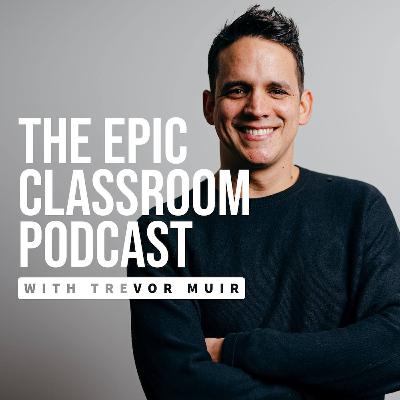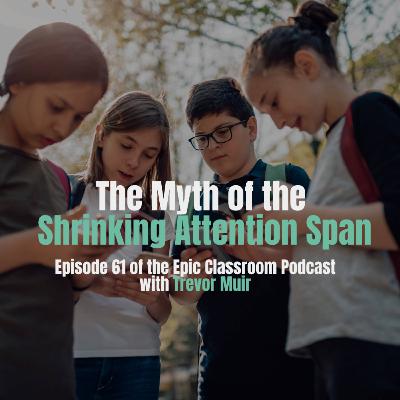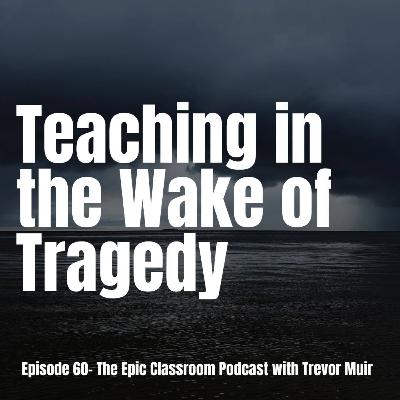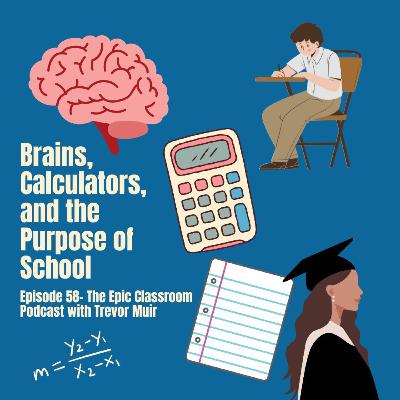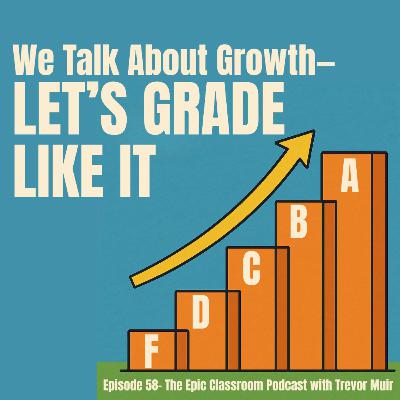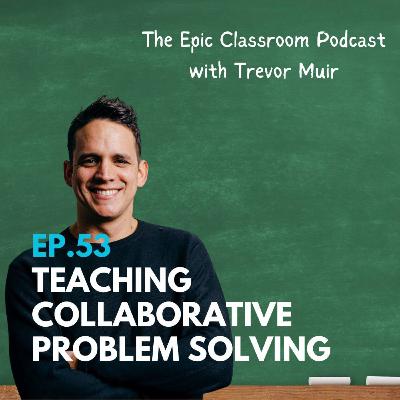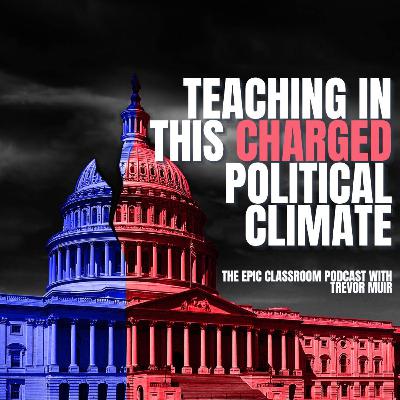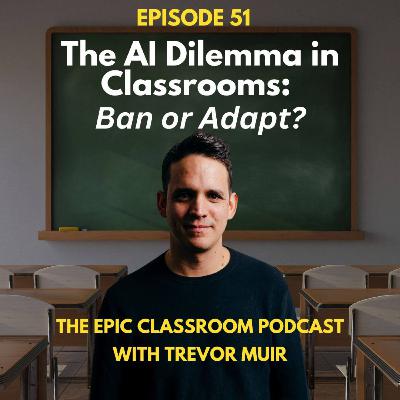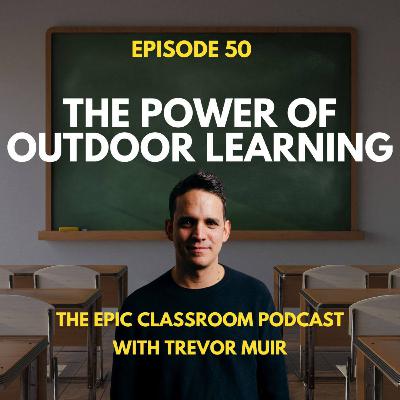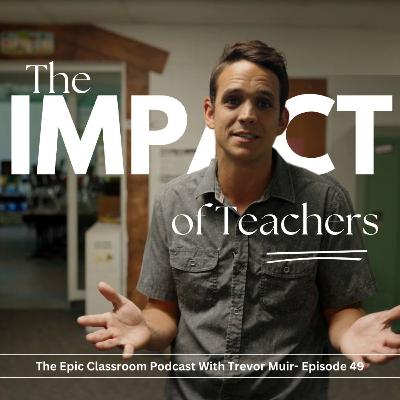Discover The Epic Classroom with Trevor Muir
The Epic Classroom with Trevor Muir

68 Episodes
Reverse
In this episode I share a winter lesson that almost got shut down after a single complaint and how my principal’s unexpected pivot changed the entire day. What happened next taught me one of the most important lessons about leadership, flexibility, and what modern students need from us. This episode is about staying open, adjusting when the moment calls for it, and why adaptability is one of the most valuable skills in today’s classrooms and workforce.
www.trevormuir.com
In this episode, I talk about the importance of knowing how to ask for what you want and need, along with what I’ve learned about helping students develop the skill of making clear, respectful requests. Because asking is one of the most essential forms of communication in adulthood, and it’s something we can start teaching long before students enter the workforce. We’ll explore how teachers can guide students through this process, the power of classroom projects that involve making real asks, and a simple framework you can use right away to help your students advocate for themselves.
Get the Ask Framework free here: https://www.trevormuir.com/ask-framework
www.trevormuir.com
A story about the power of one-on-one teaching, why it matters, and how teachers can make space for it, even in a busy classroom. Email Trevor at trevor@trevormuir.com Collaboration Toolkit: https://www.trevormuir.com/collaboration-toolkit
In this episode we talk about strategies to spark student curiosity and excitement in the classroom. Learn how passion, relevance, and student choice can turn flat lessons into engaging learning experiences. Here's the research I mention: https://news.gallup.com/poll/648896/schools-struggle-engage-gen-students.aspx?utm Read my article here: https://www.trevormuir.com/blog/student-interest
With AI tools able to record, transcribe, and even generate polished notes in seconds, it is easy to wonder: do students still need to take notes at all? In this episode, Trevor explores why the answer is a resounding yes. You will hear the brain science behind note-taking, why it leads to deeper comprehension than passive listening, and how different strategies—from handwritten notes to sketch notes to collaborative docs—can turn information into lasting learning. Discover practical ways to help your students use note-taking not just to prepare for a test, but to build critical thinking, communication, and adaptability skills that matter long after class ends.
If your students seem distracted, this episode explains why it’s not a decline in attention span but a lack of purpose — and what you can do to fix it.
Collaboration Toolkit (FREE): https://www.trevormuir.com/collaboration-toolkit
Read the article: https://www.trevormuir.com/blog/attention-span
Watch the video: https://youtu.be/pltYo40JzPg
In the days after the shooting that killed Charlie Kirk and yet another school shooting, many teachers are wondering how to respond to students who are processing fear, grief, and confusion. In this episode, Trevor shares personal stories of how teachers’ reactions shaped him during past tragedies like Columbine, 9/11, and Sandy Hook. He unpacks the psychology of emotional contagion, showing how students often mirror the emotions of the adults they trust, and offers practical guidance for approaching difficult conversations with wisdom, calm, and compassion.
Ground Rules for Class Discussion Posters: https://www.trevormuir.com/discussion-ground-rules
When calculators first appeared in classrooms, many schools banned them. Decades later, we’re asking the same kinds of questions about AI and other innovations. What do we hold onto, and what do we change? In this episode, Trevor explores the history of calculators in schools, the neuroscience of learning, the enduring value of art and music, and a simple litmus test for deciding what belongs in education today. At the heart of it all is one big question: How do we help students grow into their full potential?
In this episode, we unpack why traditional grading often fails to reflect student growth—and how competency-based grading offers a more accurate, equitable alternative. We explore what it looks like to grade for mastery, not averages, and share simple ways teachers can start making the shift.
Read the article: https://www.trevormuir.com/blog/competency-based-grading
Check out the LHRIC Tech Expo: https://it.lhric.org/tech_expo
What if the key to student engagement isn’t about attention spans, but about giving kids a reason to care? In this episode, I sit down with Jerry Kolber—executive producer of Brain Games and Who's Smarted?—to talk about the science of engagement, the power of relevance, and why a simple “because” can transform the way students learn. We’ll explore how great teaching isn’t about forcing information but about sparking curiosity—sometimes by making learning feel like anything but school.
Check out Who Smarted here.
Watch the Video: https://www.youtube.com/watch?v=L3HLzzrwYSw If we have artificial intelligence, do we still need school? Will it replace traditional classrooms? Is AI better at teaching reading and writing and math? Can school take place from a computer? Does learning always have to be plugged in? If we have chatbots with limitless knowledge and information, the entire world, at our fingertips, Do we still need teachers?
In this episode, I had an incredible conversation with Shannon Anderson about growth mindset and helping students develop one. Shannon is an award-winning children's book author, teacher, and national speaker. She served as the regional advisor for the Indiana Society of Children's Book Writers and Illustrators and was named one of the Top 10 Teachers who inspired the Today Show in 2019. Her works include "Penelope Perfect," "Mindset Power," and "Y Is for Yet," which focus on themes like perfectionism, growth mindset, and resilience.
You can find Shannon's work at https://www.shannonisteaching.com/
Pre-order her new book here.
The impact of teachers stretches far beyond the physical time with students in the classroom. But the extent of the long reach of teachers is hard to remember in the midst of all of the challenges. Here's a little story of a teacher from my past and a near-miraculous meeting 30 years later.
Today we talk about math class, slapping the word YET onto the end of certain sentences, a 99 year-old skydiver, and why teaching a growth mindset is one of the most important tasks of every educator.
Free YET posters: https://www.trevormuir.com/yet-posters
In this episode, I share a tradition from my first school: hosting a Thanksgiving feast for the entire school. More than just a meal, it was a way to build a sense of community, foster connections, and help students feel a deeper bond with their school. We’ll explore how creating a culture of belonging can impact student engagement and learning—and how small, intentional efforts can make a big difference in your classroom or school.
Creative struggle is difficult, but it's also important. In this technology age, students have become so used to instant gratification, accessing the information and the answers they need instantly rather than dealing with the stress and frustration that can come with creative problem solving. But the reality is, sometimes the struggle is necessary. So as educators, we have to teach them how to work through this.
And one of the best ways to become unstuck is through collaboration: Combining ideas and resources to solve problems. This week I share a strategy to help students learn to solve problem together.
You can read my article on this here.
There is a measurable uptick in mean and divisive behavior in schools right now, almost as if children are mirroring the current political climate. Let's talk about leading students in this charged political climate.
www.trevormuir.com
www.trevormuir.com/speaking
In this episode, we dive into the growing concern among educators about the impact of AI tools like ChatGPT in the classroom. With only 6% of American teachers believing AI does more good than harm, we explore the fears surrounding academic dishonesty, shortcuts, and the loss of critical thinking. However, banning AI isn’t the solution. We discuss strategies for adapting to AI by creating assignments that foster creativity, deep personal reflection, and real-world problem-solving. Learn how to teach students to use AI responsibly and enhance their learning in the process.
trevormuir.com
From exposure to vitamin D and its positive effects on our well-being, to the cognitive benefits that come with fresh air, to the innate joy and freedom of being outdoors, outdoor learning is beneficial for both students—and teachers. In this episode I share some ideas for how any teacher can get outside more with their students.
Read the article: https://www.trevormuir.com/blog/outdoor-learning
Check out my new book: https://www.amazon.com/New-Teacher-Mindset-Innovative-Strategies/dp/1394210086?crid=ETFBNFNCOW6W&keywords=new+teacher+mindset+muir&qid=1706209905&sprefix=new+teacher+mindset+muir,aps,108&sr=8-1&linkCode=sl1&tag=trevormuirsit-20&linkId=636126ddad3f89f665303211c450af22&language=en_US&ref_=as_li_ss_tl
Some of our most impact childhood memories happen in school. Teachers and other educators have a massive influence on their students' identities, memories, and future. Let's dive into that and explore the brain science of why that happens and how we can leave our students with a positive impression of school.


